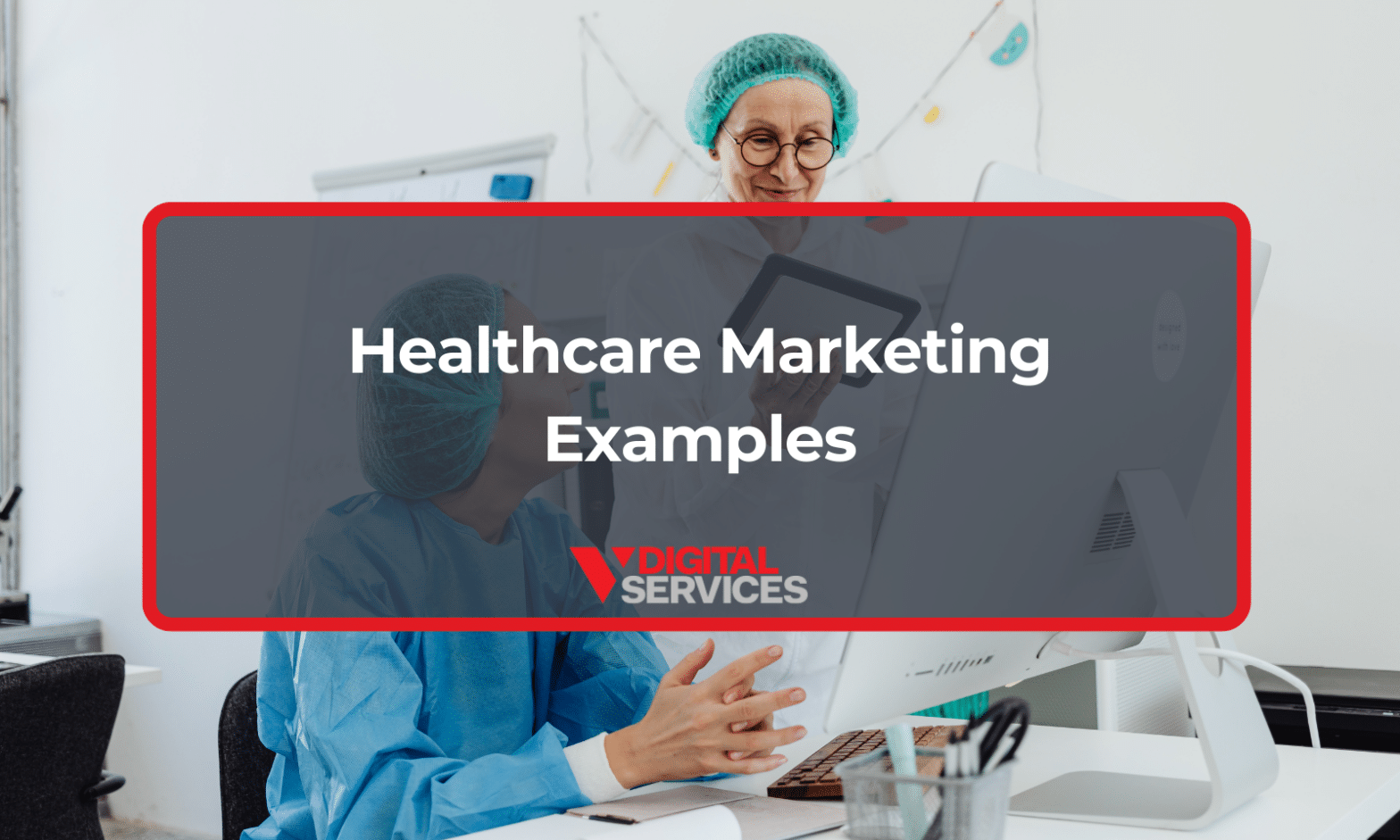The most powerful healthcare marketing examples prove that great campaigns don’t just promote services; they build trust, spark emotion, and make patients feel seen. From Cleveland Clinic’s heart-stirring “Empathy: The Human Connection” to Mayo Clinic’s storytelling-driven content and CVS Health’s digital wellness initiatives, these campaigns show how authentic connection and clear messaging can transform patient engagement. When healthcare providers use data, empathy, and personalization together, marketing becomes more than promotion; it becomes part of better patient care.
At V Digital Services, we have over a decade of experience helping healthcare providers and organizations achieve success to that of the examples mentioned, through data-driven strategies and multi-channel marketing. With our experience across the healthcare industry, from hospitals and medical practices to pharmaceutical companies and healthcare startups, we bring measurable expertise and trust. Explore our services or contact us today to start building a patient-centered healthcare brand that inspires confidence.
In this article, we’ll explore healthcare marketing examples, proven strategies, and innovative tactics that help healthcare professionals attract patients, improve outcomes, and elevate their marketing results.
What Are Some Successful Healthcare Marketing Examples?

When we look at today’s most successful healthcare marketing examples, one theme stands out: patients connect most deeply with honesty, empathy, and relevance. Take Mayo Clinic’s social media strategy, for instance. By turning complex medical information into easy-to-understand health tips and patient stories, they’ve built one of the most trusted healthcare brands in the world. Their Facebook and YouTube presence drives millions of views every month, proving that educational content can spark meaningful engagement and improve patient trust.
Another standout is the Cleveland Clinic’s “Empathy: The Human Connection” campaign, a moving video series that highlights the emotions patients and medical professionals experience daily. It didn’t just go viral—it reshaped how audiences viewed healthcare organizations, showing that compassion and storytelling could be just as powerful as traditional healthcare advertising. In a comparable manner, CVS Health’s “Health Is Everything” initiative employed a multi-channel strategy, integrating social media, digital advertisements, and community engagement to enhance awareness of preventative care and encourage healthier behaviors.
Successful healthcare marketing campaigns have several essential characteristics. These strategies encompass a concise communication strategy, a precisely identified target demographic, and a multifaceted outreach approach designed to connect with patients via various channels, including online platforms, mobile devices, and community-based settings. They remind us that marketing in the healthcare industry isn’t just about visibility; it’s about creating trust, improving patient outcomes, and strengthening relationships between healthcare providers and the people they serve.
Key Elements of Successful Campaigns
Behind every effective healthcare marketing campaign lies a clear strategy. It starts with target audience identification, understanding whether you’re communicating with potential patients, caregivers, or healthcare professionals. Once that’s clear, the next step is crafting a message that’s simple, human, and focused on patient experience. The most successful campaigns communicate value, not just services. They highlight outcomes, empathy, and expertise, creating emotional connection through personal stories and patient-centered approaches.
A multi-channel approach is equally essential. Today’s healthcare marketers use digital platforms, social media, email, and even healthcare industry conferences to reach broader audiences. Combining traditional advertising with online visibility ensures stronger community engagement and brand recognition.
How Can Healthcare Businesses Improve Their Marketing Strategies?

Healthcare marketing isn’t just about reaching more patients; it’s about connecting with the appropriate patients using the most suitable message at the optimal time. To improve your marketing efforts, healthcare organizations need to combine patient insights, personalization, and analytics to create campaigns that inspire trust and engagement. Here’s how successful healthcare providers refine their strategies to deliver real impact:
Understanding the Needs of Modern Healthcare Consumers
The first step in improving any marketing strategy is understanding your audience. Today’s healthcare consumers are more informed, digitally connected, and selective in their service choices. By understanding patients’ behaviors, preferences, and concerns, healthcare marketers can craft campaigns that address real needs, raise awareness, and improve patient outcomes. This approach ensures your messages resonate with potential patients and build meaningful relationships.
Personalizing Marketing to Improve Patient Engagement
Personalization is no longer optional—it’s essential. Tailored content, patient-specific health tips, and customized outreach create a deeper connection between healthcare providers and their communities. Personalized email campaigns, mobile notifications, and targeted social media content increase engagement, improve patient experience, and drive loyalty, helping healthcare organizations stand out in a crowded digital landscape.
Using Data and Analytics to Refine Marketing Efforts
Data is the backbone of smarter marketing decisions. By tracking metrics such as patient acquisition, engagement rates, and campaign ROI, healthcare marketers can identify what works and what doesn’t. Analytics allow for continuous optimization, ensuring marketing efforts are both efficient and effective. Leveraging healthcare marketing analytics enables providers to maximize impact while minimizing wasted effort and cost.
Creating a Consistent Brand Experience Across Digital Channels
Patients interact with healthcare organizations across multiple touchpoints, from social media platforms to appointment portals. A consistent brand experience ensures your message is cohesive, professional, and trustworthy. Maintaining visual identity, tone, and messaging across all channels strengthens recognition and builds confidence, which ultimately enhances patient relationships and engagement.
Leveraging Educational Content to Build Authority and Trust
Healthcare organizations that provide valuable information position themselves as trusted experts. Blogs, videos, webinars, and downloadable resources educate patients, address common health concerns, and improve overall health literacy. Sharing knowledge not only boosts patient trust but also enhances your reputation as a thought leader in the healthcare industry.
Integrating Technology and Automation for Better Results
Modern healthcare marketing strategies are amplified by technology. Automation tools streamline communication, segment audiences, and deliver timely updates, freeing teams to focus on strategy and patient engagement. By integrating marketing technology with personalized campaigns, healthcare providers can reach more patients efficiently while improving the patient-centered approach that drives loyalty and positive outcomes.
What Are Some Innovative Digital Marketing Tactics for Healthcare?

The healthcare industry is evolving fast, and so are the ways organizations connect with patients. Innovative digital marketing tactics allow healthcare providers to reach audiences more effectively, improve patient engagement, and strengthen trust. From social media campaigns to AI-driven tools, today’s best healthcare marketing strategies combine creativity, technology, and personalization to deliver measurable results.
Leveraging Social Media for Patient Engagement
Social media platforms have become essential tools for healthcare marketers. Hospitals, clinics, and healthcare professionals use platforms like Facebook, Instagram, and LinkedIn to share patient stories, health tips, and updates about services. Thoughtful social media promotion can raise awareness, drive community engagement, and position healthcare organizations as trusted authorities. The key is to choose platforms where potential patients are most active and create content that educates, inspires, and encourages interaction.
Implementing Video Content to Educate and Inspire
Video is one of the most engaging ways to communicate complex healthcare information. Campaigns that feature patient stories, medical procedures explained simply, or wellness tips can resonate deeply with audiences. Videos help healthcare providers humanize their brand, improve patient understanding, and create an emotional connection that static content often cannot achieve. Incorporating video content into your digital channels is a proven way to increase engagement and strengthen trust.
Utilizing Email Marketing for Personalized Communication
Email marketing remains a powerful channel for personalized patient communication. Healthcare organizations can send tailored content, appointment reminders, health tips, and educational resources directly to patients’ inboxes. Automation and segmentation allow marketers to deliver the right message at the right time, enhancing patient engagement and loyalty. Effective healthcare email marketing examples show that personalized, relevant communication drives measurable results while supporting better patient outcomes.
Hosting Virtual Healthcare Marketing Events and Webinars
Healthcare marketing events, online webinars, and virtual workshops are increasingly popular ways to educate and engage patients. These digital experiences allow healthcare organizations to share valuable information, answer questions in real time, and connect with broader audiences without geographic limitations. Attending or hosting healthcare industry conferences and medical trade shows online also positions organizations as leaders in the field, building credibility and fostering community engagement.
Exploring Emerging Technologies: AI, Chatbots, and Interactive Tools
Emerging technologies like AI-powered chatbots, interactive quizzes, and personalized patient portals are changing how healthcare providers communicate with audiences. These tools can answer patient questions instantly, guide them through services, and provide a more seamless, patient-centered experience. Integrating technology into marketing campaigns not only improves efficiency but also strengthens the patient experience and encourages meaningful engagement with your healthcare brand.
How Do Healthcare Providers Measure Marketing Success?
Measuring marketing success in the healthcare industry is about more than counting clicks—it’s about understanding impact, improving patient engagement, and demonstrating ROI. Healthcare marketers rely on a combination of metrics, feedback, and analytics to determine which strategies work and how campaigns influence patient behavior. By tracking performance systematically, healthcare organizations can refine their approach and maximize both outreach and outcomes.
Tracking Patient Acquisition and Conversion Rates
One of the most critical indicators of marketing success is patient acquisition. By monitoring how many potential patients respond to campaigns and convert into appointments or consultations, healthcare organizations can see which marketing strategies are most effective. Understanding conversion rates helps marketers allocate resources wisely and focus on tactics that attract and retain patients, ensuring that every campaign contributes to growth.
Measuring Engagement Across Digital Channels
Engagement metrics reveal how patients interact with content across social media platforms, websites, and email campaigns. Likes, shares, comments, time on site, and click-through rates provide insight into what content resonates with your audience. Measuring engagement allows healthcare marketers to adjust messaging, enhance visibility, and strengthen patient relationships across digital channels.
Monitoring Return on Investment (ROI) and Campaign Effectiveness
ROI is the ultimate measure of whether a marketing strategy delivers real value. Healthcare organizations track ROI by comparing campaign costs against tangible outcomes such as new patient visits, service inquiries, or revenue growth. Regularly monitoring campaign effectiveness ensures that marketing budgets are spent efficiently and that every effort supports measurable business goals.
Using Surveys and Patient Feedback to Gauge Satisfaction
Direct patient feedback provides critical insights into the success of marketing efforts. Surveys, reviews, and feedback forms help healthcare providers understand patient satisfaction, preferences, and areas for improvement. Incorporating these insights ensures campaigns remain patient-centered, enhancing trust, loyalty, and overall patient experience.
Leveraging Advanced Analytics Tools for Continuous Improvement
Advanced analytics platforms allow healthcare marketers to track multiple metrics simultaneously, identify patterns, and make data-driven decisions. From predictive analytics to marketing dashboards, these tools help optimize campaigns in real time, improving effectiveness and maximizing results. Leveraging analytics ensures healthcare organizations can measure impact accurately, adjust strategies proactively, and achieve continuous improvement.
Case Study: Northern Illinois Vein Clinic
Northern Illinois Vein Clinic and its sister site were losing visibility after a larger franchise entered their region. Prior SEO strategies, specifically content duplication across multiple websites, had led to a decrease in search engine rankings and penalties imposed by Google.
We deployed a targeted organic SEO effort focused on expert-driven content and authority-building. They created unique blogs on high-traffic keywords like “varicose veins” and “tingling veins,” and restructured the core service pages to remove duplicate content and better differentiate the clinic’s offering. The campaign delivered impressive gains across key metrics:
- Sessions rose by 181%.
- New sessions increased by 90%.
- Conversions improved by 12.7%.
- Clicks increased by 245.96%.
- Impressions grew by 74.01%.
- Click-through rate (CTR) rose by 98.80%.
Ready to Elevate Your Marketing?
From empathy-driven campaigns to analytics-based decision-making, today’s most successful healthcare marketing examples prove that connection and strategy go hand in hand. Whether it’s through social media engagement, personalized email communication, or innovative digital marketing, healthcare providers can transform patient relationships and drive measurable success. Let V Digital Services help you harness these insights to grow your healthcare brand and achieve a lasting positive impact!
At V Digital Services, our healthcare marketing professionals bring expertise, innovation, and trust to every healthcare marketing project. Our proven experience across medical practices, healthcare institutions, and healthcare marketing workshops makes us the partner you can rely on for effective marketing strategies. Reach out to us today to start your success story.
FAQs
At V Digital Services, our extensive experience working with healthcare providers and organizations enables us to answer your most pressing questions about digital marketing in the healthcare industry. We combine proven expertise with data-driven insights to deliver marketing campaigns that improve visibility, patient engagement, and outcomes.
What Are Some Successful Healthcare Marketing Examples?
Successful healthcare marketing examples include campaigns like Cleveland Clinic’s “Empathy: The Human Connection,” Mayo Clinic’s educational content series, and CVS Health’s “Health Is Everything” initiative. These campaigns leveraged emotional storytelling, multi-channel promotion, and patient-centered messaging to increase engagement and build trust.
How Can Healthcare Businesses Improve Their Marketing Strategies?
Healthcare organizations can improve their marketing strategies by understanding patient needs, personalizing content, using analytics to optimize campaigns, and maintaining a consistent brand experience across digital platforms. Focusing on education, trust, and meaningful engagement drives measurable results.
How Can Personalization Be Integrated Into Healthcare Marketing Strategies?
Personalization can be achieved through tailored email campaigns, customized health tips, patient-specific reminders, and targeted social media content. Leveraging technology and data allows healthcare marketers to deliver relevant, timely, and meaningful messages that increase patient engagement.
What Are the Best Digital Marketing Tactics for Healthcare Organizations?
The best tactics include social media promotion, video content, email marketing, virtual healthcare marketing events, and emerging technologies like AI-powered chatbots. These approaches improve patient education, engagement, and overall trust in healthcare brands.
How Do Healthcare Providers Measure the Success of Their Marketing Campaigns?
Healthcare providers track key performance indicators (KPIs) such as patient acquisition, engagement rates, ROI, and patient feedback. Advanced analytics tools and surveys allow organizations to refine campaigns and continuously improve marketing performance.
What Role Do Social Media Platforms Play in Healthcare Marketing?
Social media platforms enable healthcare organizations to educate, engage, and build community relationships. Platforms like Facebook, Instagram, and LinkedIn provide channels for sharing patient stories, health tips, and service updates that strengthen brand trust.
How Can Healthcare Content Marketing Improve Patient Engagement?
Content marketing that offers valuable educational resources, blog posts, videos, and webinars positions healthcare organizations as trusted experts. By addressing patient concerns and sharing actionable health information, marketers can increase engagement and loyalty.
What Metrics Should Healthcare Marketers Track for Effective Campaigns?
Healthcare marketers should monitor patient acquisition, conversion rates, engagement metrics, ROI, and satisfaction feedback. These metrics help evaluate campaign effectiveness and identify opportunities for improvement.
How Can Healthcare Organizations Use Analytics to Optimize Marketing Efforts?
Analytics tools allow healthcare organizations to track campaign performance, understand patient behavior, and adjust strategies in real time. Data-driven decision-making ensures marketing efforts are efficient, targeted, and impactful.



